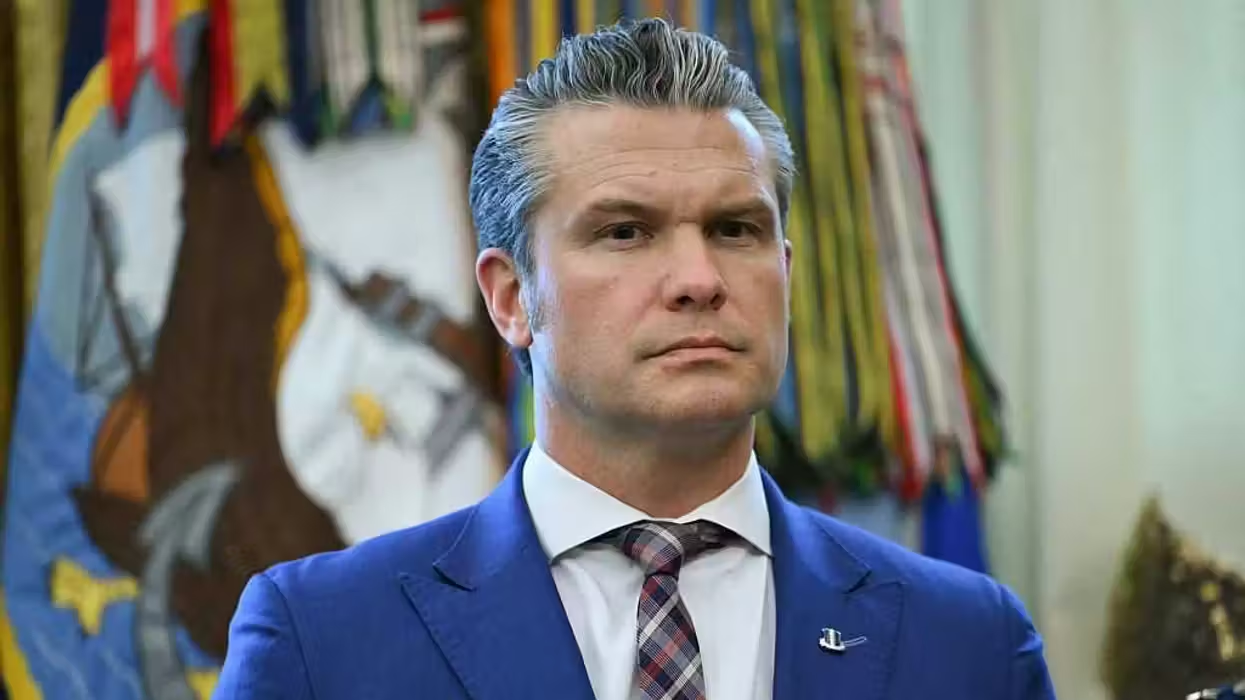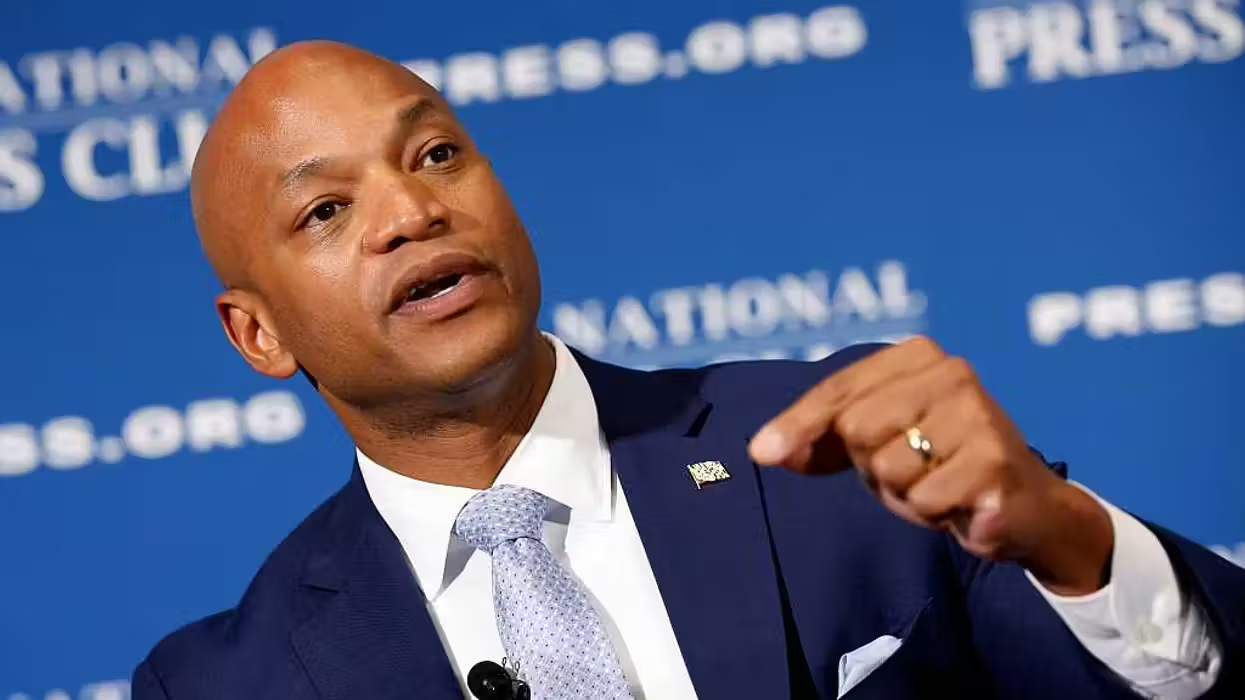
© 2025 Blaze Media LLC. All rights reserved.
"All the noblest virtues of individuals were gathered to strengthen the destructive capacity of the mass"
 At war: Lieutentant Colonel Winston Churchill with the 6th Battalion, The Royal Scottish Fusiliers, during the First World War. (Image Source: Daily Mail)
At war: Lieutentant Colonel Winston Churchill with the 6th Battalion, The Royal Scottish Fusiliers, during the First World War. (Image Source: Daily Mail)
Winston Churchill left for posterity a great mass of writings about the Western world in war and peace, from the perspective of a military leader, politician and historian.
On this hundredth anniversary of the beginning of World War I, the below reflections in the aftermath of that war, as originally published on January 1, 1929 in Churchill's "The Aftermath," and quoted in his "The Gathering Storm" are as striking and prescient as they are eloquent. Not only do they provide a telling window into the state of the world following "The Great War," but serve as an eerie precursor to World War II, the Cold War and even today.
It was not until the dawn of the twentieth century of the Christian era that war began to enter into its kingdom as the potential destroyer of the human race. The organisation of mankind into great States and Empires, and the rise of nations to full collective consciousness, enabled enterprises of slaughter to be planned and executed upon a scale and with a perseverance never before imagined. All the noblest virtues of individuals were gathered to strengthen the destructive capacity of the mass. Good finances, the resources of world-wide credit and trade, the accumulation of large capital reserves, made it possible to divert for considerable periods the energies of whole peoples to the task of devastation. Democratic institutions gave expression to the will-power of millions. Education not only brought the course of the conflict within the comprehension of everyone, but rendered each person serviceable in a high degree for the purpose in hand. The Press afforded a means of unification and of mutual stimulation. Religion, having discreetly avoided conflicted on the fundamental issues, offered its encouragements and consolations, through all its forms, impartially to all the combatantts. Lastly, Science unfolded her treasures and her secrets to the desperate demands of men, and placed in tehir hands agencies and appartus almost decisive in their character.
[sharequote align="center"]the noblest virtues of individuals were gathered to strengthen the destructive capacity of the mass[/sharequote]
In consequence, many novel features presented themselves. Instead of merely fortified towns being starved whole nations were methodically subjectd, or sought to be subjected, to the process of reduction by famine. The entire population in one capacity or another took part in the war; all were equally the object of attack, The air opened paths along which death and terror could be carried far behind the lines of the actual armies, to women, children, the aged, the sick, who in earlier struggles would perforce have been left untouched. Marvelous orgnisations of railroads, steamships, and motor vehicles placed and maintained tens of millions of men continuously in action. Healing and surgery in their exquisitve developments returned them again and again to the shambles. Nothing was wasted that could contribute to the process of waste. The last dying kick was brought into military utility.
But all that happened in the four years of the Great War was only a prelude to what was preparing for the fifth year. The campaign of the year 1919 would have witnessed an immense accession to the powers of destruction. Had the Germans retained the morale to make good their retreat to the Rhine, they would have been assaulted in the summer of 1919 with forces and by methods incomparably more prodigious than any yet employed. Thousands of aeroplanes would have shattered their cities. Scores of thousands of cannon would have blasted their front. Arrangements were being made to carry simultaneously a quarter of a million men, together with all their requirements, continuously forward across country in mechanical vehicles moving ten or fifteen miles each day. Poison gases of incredible malignity, against which only a secret mask (which the Germans could not obtain in time) was proof, would have stifled all resistance and paralysed all life on he hostile front subjected to attack. No doubt the Germans too had their plans. But the hour of wrath had passed. The signal of relief was given, and the horrors of 1919 remained buried in the archives of the great antagonists.
 The western front in France, 1916. British troops are going over the top of the trenches during the Battle of the Somme, in a battle in which over one million people were killed over five months. (Image Source: Getty Images.)
The western front in France, 1916. British troops are going over the top of the trenches during the Battle of the Somme, in a battle in which over one million people were killed over five months. (Image Source: Getty Images.)
The war stopped as suddenly and as universally as it had begun. The world lifted its head, surveyed the scene of ruin, and victors and vanquished alike drew breath. In a hundred laboratories, in a thousand arsenals, factories, and bureaux, men pulled themselves up with a jerk, and turned from the task in which they had been absorbed. Their projects were put aside unfinished, unexecuted; but their knowledge was preserved; their data, calculations, and discoveries were hastily bundled together and docketed "for future reference" by the War Offices in every country. The campaign of 1919 was never fought; but its ideas go marching along. In every army they are being explored, elaborated, refined under the surface of peace, and should war come again to the world it is not with the weapons and agencies prepared for 1919 that it will be fought, but with developments and extensions of these which will be incomparably more formidable and fatal.
It is in these circumstances that we entered upon that period of exhaustion which has been described as Peace. It gives us, at any rate, an opportunity to consider the general situation. Certain sombre facts emerge, solid, inexorable, like the shapes of mountains from drifting mist. It is established that henceforward whole populations will take part in war, all doing their utmost, all subjected to the fury of the enemy. It is established that nations who believe their life is at stake will not be restrained from using any means to secure their existence. It is probably--nay, certain--that among the means which will next time be at their disposal will be agencies and process of destruction wholesale, unlimited, and perhaps, once launched, uncontrollable.
[sharequote align="center"]The campaign of 1919 was never fought; but its ideas go marching along[/sharequote]
Mankind has never been in this position before. Without having improved appreciably in virtue or enjoying wiser guidance, it has got into its hands for the first time the tools by which it can unfailingly accomplish its own extermination. That is the point in human destinies to which all the glories and toils of men have at last led them. They would do well to pause and ponder upon their new responsibilities. Death stands at attention, obedient, expectant, ready to serve, ready to shear away the peoples en masse; ready, if called on, to pulverise, without hope of repair, what is left of civilisation. He awaits only the word of command. He awaits it from a frail, bewildered being, long his victim, now--for one occasion only--his Master.
Churchill laments that 18 years later he "could not write it differently." He continues:
There can hardly ever have been a war more easy to prevent than this second Armageddon...had our British, American, and Allied affairs been conducted with the ordinary consistency and common sense usual in decent households there was no need for Force to march unaccompanied by law; and Strength, moreover, could have been used in righteous causes with little risk of bloodshed. In their loss of purpose, in their abandonment even of the themes they most sincerely espoused, Britain, France, and most of all, because of their immense power and impartiality, the United States, allowed conditions to be gradually built up which led to the very climax they dreaded most. They have only to repeat the same well-meaning, short-sighted behavior towards the new problems which in singular resemblance confront us today to bring about a third convulsion from which none may live to tell the tale.
Churchill elaborates on the errors of the Western powers in one particularly compelling passage, writing that World War II could have easily been prevented were it not for:
how the malice of the wicked was reinforced by the weakness of the virtuous; how the structure and habits of democratic States, unless they are welded into larger organisms, lack those elements of persistence and conviction which can alone give security to humble masses; how, even in matters of self-preservation, no policy is pursued for even ten or fifteen years at a time. We shall see how the counsels of prudence and restraint may become the prime agents of mortal danger; how the middle course adopted from desires for safety and a quiet life may be found to lead direct to the bull's-eye of disaster. We shall see how absolute is the need of a broad path of international action pursued by many States in common across the years, irrespective of the ebb and flow of international politics.
Note: The links to the books in this post will give you an option to elect to donate a percentage of the proceeds from the sale to a charity of your choice. Mercury One, the charity founded by TheBlaze’s Glenn Beck, is one of the options. Donations to Mercury One go towards efforts such as disaster relief, support for education, support for Israel and support for veterans and our military. You can read more about Amazon Smile and Mercury One here.
–
Follow Ben Weingarten (@bhweingarten) and TheBlazeBooks on Twitter and Facebook.
Want to leave a tip?
We answer to you. Help keep our content free of advertisers and big tech censorship by leaving a tip today.
Want to join the conversation?
Already a subscriber?
Ben Weingarten is a writer, commentator, and editor at large at RealClearInvestigations. He is a senior contributor at the Federalist and writes columns for Newsweek and the Epoch Times.
Ben Weingarten
Ben Weingarten is a writer, commentator, and editor at large at RealClearInvestigations. He is a senior contributor at the Federalist and writes columns for Newsweek and the Epoch Times.
more stories
Sign up for the Blaze newsletter
By signing up, you agree to our Privacy Policy and Terms of Use, and agree to receive content that may sometimes include advertisements. You may opt out at any time.
Related Content
© 2025 Blaze Media LLC. All rights reserved.
Get the stories that matter most delivered directly to your inbox.
By signing up, you agree to our Privacy Policy and Terms of Use, and agree to receive content that may sometimes include advertisements. You may opt out at any time.






